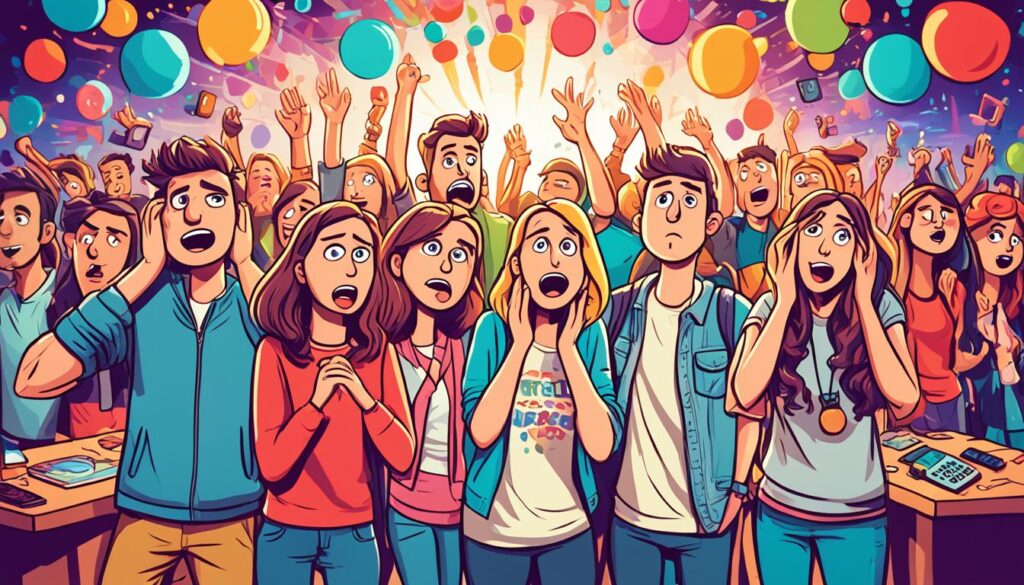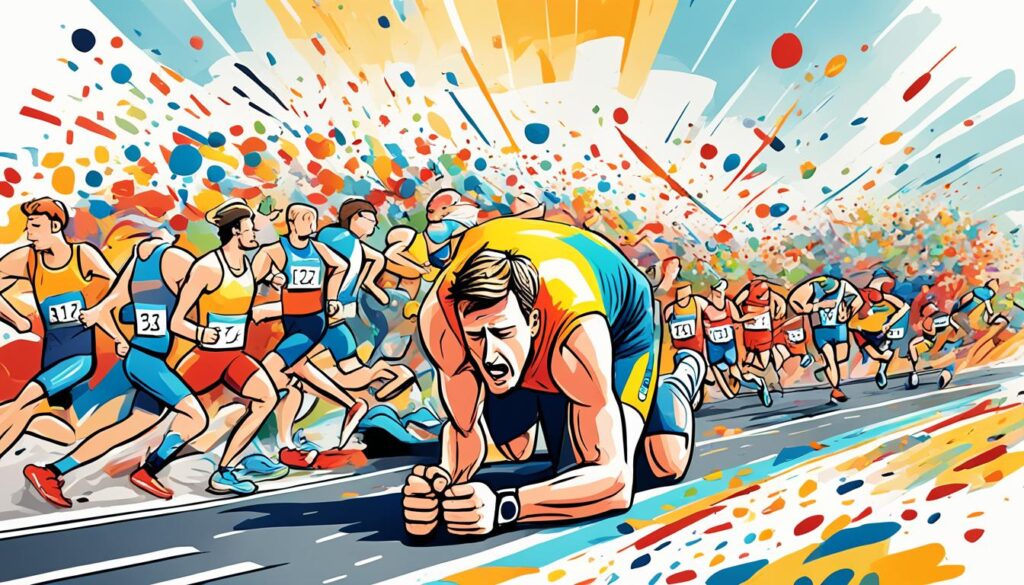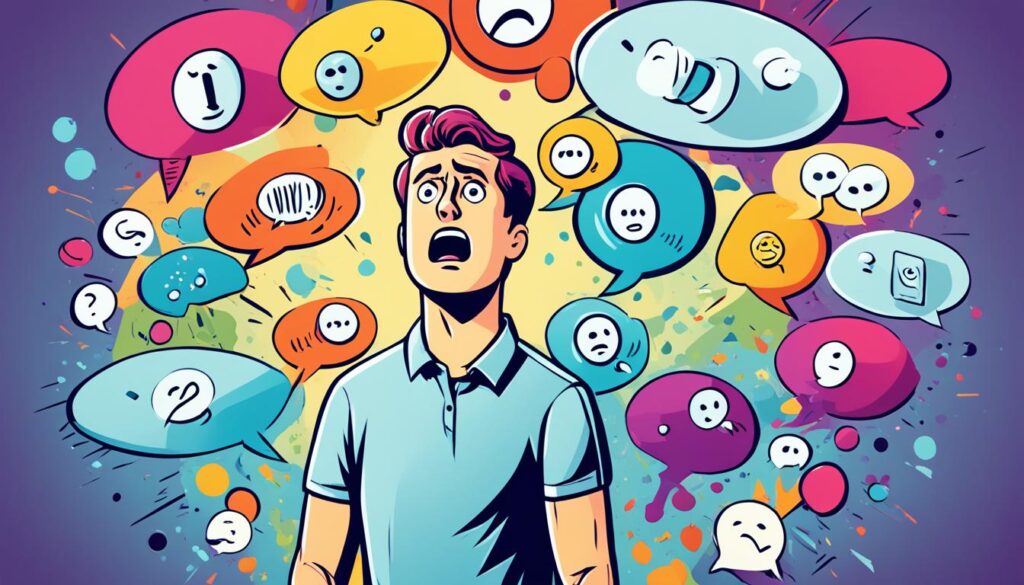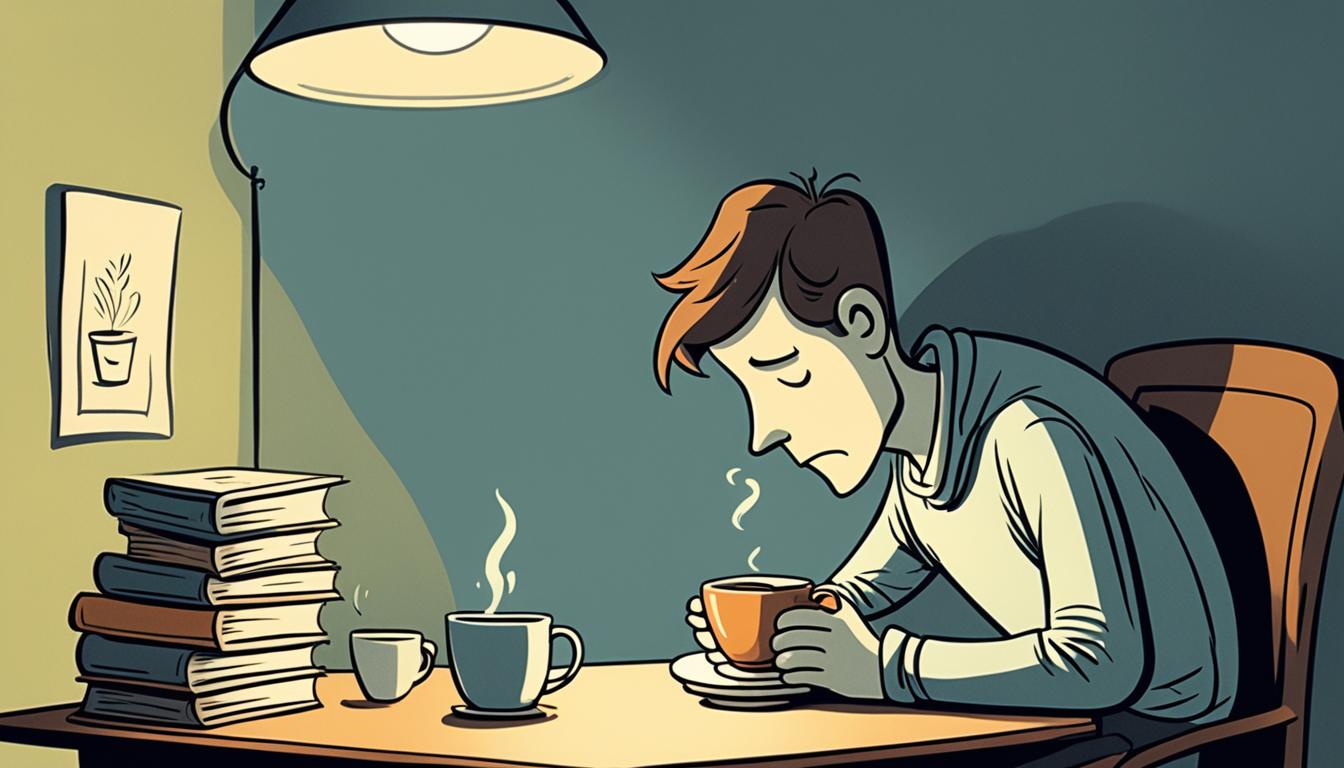Introverts are often portrayed as reserved and quiet individuals who prefer solitude over socializing. But do introverts truly get tired easily, or is it just a common misconception?
Contrary to popular belief, introverts’ fatigue patterns are influenced by specific situations that can drain their energy levels. Understanding these situations is crucial for introverts to effectively manage their energy and prevent exhaustion.
In this article, we will explore the seven situations that can exhaust introverts, debunking myths and shedding light on the unique challenges introverts face in maintaining their energy levels.
Key Takeaways:
- Introverts experience fatigue in certain situations, contrary to common beliefs.
- Understanding these situations helps introverts manage their energy levels effectively.
- This article explores the seven scenarios that can exhaust introverts.
- Debunking myths surrounding introverts’ energy levels is crucial for a better understanding.
- By implementing self-care strategies, introverts can maintain their energy and overall well-being.
1. Small Talk: The Energy Vampire
Small talk, characterized by superficial and casual conversations, can often leave introverts feeling drained and exhausted. Unlike meaningful and in-depth interactions, small talk lacks the depth and connection that introverts seek in their social interactions. Spending extended periods of time engaging in shallow conversations can lead to what is commonly known as the introvert hangover – a state of extreme exhaustion and depletion of energy.
Introverts thrive on spending time in environments that provide them with the necessary levels of stimulation and meaningful engagement. Unfortunately, small talk often fails to meet these requirements, leaving introverts feeling mentally and physically exhausted. The constant social interaction and the pressure to engage in small talk can overstimulate introverts, leading to an overwhelming feeling of fatigue and a need for solitude to recharge.
During small talk, introverts may find themselves expending more energy than they are able to replenish. This can be attributed to the difference in the levels of stimulation that introverts prefer compared to extroverts. Introverts are more sensitive to external stimuli and tend to thrive in environments with lower levels of stimulation. Engaging in excessive small talk can overwhelm introverts and deplete their mental energy reserves.
So how can introverts manage their energy levels during small talk situations?
- Set boundaries: Prioritize your energy and know when to excuse yourself from small talk conversations. Allocate time to recharge and take breaks.
- Find common ground: Look for shared interests and topics that you genuinely enjoy discussing. Engaging in conversations that hold personal meaning can help sustain your energy.
- Deepen the conversation: Take the initiative to transition from small talk to more meaningful discussions. Ask open-ended questions and encourage others to share their thoughts and experiences.
- Have an exit strategy: Plan in advance how you will gracefully exit a small talk conversation when you feel your energy draining. This will allow you to recharge and preserve your mental and emotional well-being.
By being mindful of their energy levels and employing these strategies, introverts can navigate small talk situations more effectively, preserving their energy and avoiding exhaustion.
2. Large Gatherings: The Sensory Overload
Large gatherings and crowded events can be particularly challenging for introverts, leading to sensory overload and potential burnout. As an introvert, being in a group of friends or attending a social event can result in excessive stimulation that can quickly drain your energy reserves. The combination of noise, conversations, and constant social interactions can become overwhelming, leaving you feeling mentally and physically exhausted.
Social media also plays a role in contributing to social exhaustion for introverts. The constant stream of information, notifications, and the pressure to socially engage online can add to the already overwhelming stimuli of a large gathering. It can be difficult for introverts to find moments of solitude and recharge when they are constantly connected to social media platforms.
To recharge and avoid burnout after attending large gatherings, it’s important for introverts to prioritize alone time. Taking breaks during the event to find a quiet space, stepping outside for fresh air, or simply finding a comfortable corner to relax can provide much-needed relief. These moments of solitude allow introverts to recharge their energy levels and prevent social exhaustion.
“Large gatherings can be overwhelming for introverts. The noise, conversations, and constant social interactions can quickly drain their energy reserves.”
Here are some strategies that introverts can consider:
- Plan breaks: Schedule short breaks throughout the event to step away and recharge.
- Find quiet spaces: Seek out quieter areas where you can take a moment for yourself.
- Practice deep breathing: Deep breathing exercises can help reduce stress and restore calmness.
- Limit social media use: Set boundaries for social media usage during large gatherings to avoid additional stimulation.
- Communicate your needs: Let your friends or event organizers know that you may need occasional breaks or moments of solitude.

| Challenges in Large Gatherings | Strategies for Recharging |
|---|---|
| Sensory overload | Schedule breaks and find quiet spaces |
| Social media stimulation | Limit social media use during events |
| Constant social interactions | Practice deep breathing exercises |
| Communicate your needs to friends and organizers |
3. Open-Plan Offices: The Productivity Killer
Open-plan offices have become increasingly popular in modern workplaces, with the aim of fostering collaboration and communication among employees. However, for sensitive individuals and introverts, these environments can be overwhelming and draining.
Introverts, who tend to be more sensitive to environmental stimuli, can struggle in open-plan offices. According to Carl Jung’s theories, introverts have a preference for quiet and solitude to recharge their energy. The constant buzz of conversations, noise, and distractions in open-plan offices can be a source of social anxiety and exhaustion for introverts.
The high level of stimulation in open-plan offices can deplete introverts’ mental energy. Introverts thrive in quieter and more focused environments where they can fully concentrate on their work without constant interruptions.
To cope with the challenges of working in an open-plan office, introverts can implement a few strategies:
- Create a designated quiet space: Set up a designated area in the office where introverts can retreat to for some uninterrupted, focused work time.
- Use noise-cancelling headphones: Investing in noise-cancelling headphones can help block out distractions and create a more peaceful work environment.
- Take regular breaks: It’s important for introverts to take regular breaks to recharge their energy throughout the day. Taking short walks outside the office or finding a quiet spot for a few moments of solitude can help replenish their mental energy.
- Communicate your needs: Introverts should communicate their needs to their colleagues or managers. Sharing their preference for quieter environments and explaining how it affects their productivity can help foster a more understanding and accommodating work environment.
By implementing these strategies, introverts can navigate the challenges of open-plan offices and create a workspace that aligns with their introverted nature, leading to improved productivity and overall well-being.
4. Constant Socializing: The Marathon Without a Finish Line
Constant socializing in various social settings can have a significant impact on introverts’ energy levels and overall well-being. As introverts naturally thrive in quieter and more solitary environments, prolonged periods of social interaction can lead to overstimulation and burnout.
Overstimulation occurs when introverts are exposed to excessive external stimuli, such as noise, conversations, and social activities, without adequate time to recharge and recuperate. This overstimulation can quickly deplete their mental energy, leaving them feeling drained and exhausted.
When introverts reach a point of social exhaustion, they may experience both physical and mental symptoms. Physically, they might feel fatigued, experiencing headaches, muscle tension, and even digestive problems. Mentally, they may feel overwhelmed, irritable, and have difficulty concentrating or making decisions.
To manage their energy and set boundaries in social situations, introverts can employ various strategies:
- Plan downtime: Engage in activities that promote solitude and introspection to recharge mentally and emotionally.
- Select social events wisely: Choose social gatherings that align with their comfort levels and provide opportunities for meaningful connections.
- Take breaks: Find moments during social interactions to step away and have alone time to prevent overwhelm.
- Communicate needs: Clearly express their boundaries and limitations to friends, family, and colleagues to ensure they have the necessary time and space for recharge.
By recognizing the impact of constant socializing and taking proactive steps to manage their energy, introverts can navigate social settings with greater ease and maintain their well-being.

5. Decision Fatigue: The Choice Paralysis
In today’s fast-paced world, introverts often find themselves overwhelmed by the constant barrage of decisions they have to make. This phenomenon is known as decision fatigue, and it can have a significant impact on their energy levels and overall well-being.
Introverts tend to be more reflective and thoughtful in their decision-making process. They carefully consider all the possibilities, weighing the pros and cons before reaching a conclusion. This attention to detail and deep analysis can be exhausting, leading to increased stress levels and social fatigue.
When introverts are constantly faced with making decisions, they can experience a form of mental burnout, known as decision fatigue. The cumulative effect of making choices throughout the day can deplete their mental energy reserves, leaving them feeling drained and overwhelmed.
However, there are strategies that introverts can employ to mitigate the effects of decision fatigue and recharge their energy levels:
- Limit the number of decisions: Prioritize and delegate tasks whenever possible to reduce the number of choices you have to make.
- Create routines: Establishing regular routines can help minimize the need for decision-making, freeing up mental energy for more important matters.
- Take breaks: Incorporate regular breaks throughout the day to give yourself time to recharge and regain focus.
- Seek personal support: Surround yourself with understanding friends, family, and colleagues who can provide emotional support and help alleviate the burden of decision-making.
- Practice self-care: Engage in activities that help reduce stress and promote relaxation, such as exercise, meditation, or creative pursuits.
| Signs of decision fatigue | Ways to reduce decision fatigue |
|---|---|
| Difficulty making even simple choices | Prioritize and delegate tasks |
| Increased stress levels | Create routines |
| Indecisiveness and procrastination | Take breaks |
| Feeling overwhelmed and drained | Seek personal support |
| Lack of focus and concentration | Practice self-care |
“Decision fatigue is real and can significantly impact your energy levels. By implementing strategies to reduce decision-making, you can reclaim your mental energy and improve your overall well-being.” – Dr. Emily Foster, Psychologist
By understanding the effects of decision fatigue and implementing strategies to manage it, introverts can minimize the impact of constant decision-making on their stress levels, social fatigue, and overall energy levels. Remember to prioritize self-care and seek personal support when needed, as these can greatly contribute to your ability to recharge and maintain a healthy balance.
6. Emotional Intensity: The Empathetic Sponge
Introverts are known for their ability to deeply connect with others and understand their emotions on a profound level. This emotional intensity sets introverts apart from extroverts and can have a significant impact on their energy levels and overall well-being. Unlike extroverts who may thrive in social settings, introverts often find themselves absorbing and processing emotions in a different way.
For introverts, being empathetic means not only experiencing their own emotions but also sensing and internalizing the emotions of those around them. This heightened emotional awareness requires a lot of energy, as introverts are constantly processing the feelings of others while still dealing with their own emotional responses.
The nervous system plays a crucial role in regulating introverts’ emotional energy. The highly sensitive nature of introverts’ nervous systems can amplify their emotional experiences, making them more susceptible to feeling overwhelmed or exhausted in emotionally intense situations.
Managing emotional intensity is essential for introverts to prevent emotional burnout. Here are some strategies that introverts can employ to take care of their emotional well-being:
- Practice self-care activities that help recharge your emotional energy, such as journaling, meditation, or spending time in nature.
- Set boundaries in your relationships and social interactions. Allow yourself to step back when you feel emotionally overwhelmed.
- Engage in activities that bring you joy and allow you to express your emotions in a healthy way, such as creative arts or physical exercise.
- Seek support from loved ones who understand and respect your emotional needs.
- Take regular breaks from emotionally demanding situations to give yourself the opportunity to recharge.
By acknowledging and managing their emotional intensity, introverts can navigate their empathetic nature more effectively and maintain better emotional well-being.

Note: The image above represents the emotional intensity that introverts may experience.
7. Unrealistic Expectations: The Pressure to Conform
Introverts often face societal pressure and self-imposed expectations that can contribute to their exhaustion. The unrealistic expectations placed upon introverts can create a constant inner conflict as their preference for solitude and comfort zone clash with extroverted norms.
Imagine a scenario where an introverted individual is expected to attend multiple social gatherings in a week. The pressure to conform to these expectations can be overwhelming and draining for introverts who thrive in quieter and more intimate settings. Society often equates extroversion with success and popularity, leading introverts to question their own natural tendencies.
Neurotransmitters, such as dopamine, also play a role in introverts’ energy levels during social situations. The stimulation of certain activities, such as loud parties or constant socializing, triggers the release of dopamine, leading to feelings of fatigue and exhaustion for introverts. This physiological response can further exacerbate the pressure to conform, as introverts struggle to maintain the same level of energy as their extroverted counterparts.
To overcome unrealistic expectations and find balance between introversion and societal demands, introverts can implement various strategies. Some of these strategies include:
- Setting clear boundaries and communicating their needs to others
- Practicing self-care and prioritizing alone time to recharge
- Finding ways to engage in activities that align with their interests and values
- Surrounding themselves with a supportive network of friends and loved ones who understand and respect their introverted nature
| Unrealistic Expectations | Introverts | Comfort Zone | Extroversion | Neurotransmitter | Intimacy |
|---|---|---|---|---|---|
| Pressure to conform to extroverted norms | Preference for solitude and quiet settings | Innate need for personal space and familiar environments | Societal emphasis on outgoing and sociable behavior | Impact of dopamine on introverts’ energy levels | Yearning for deep emotional connections |
| Creating a constant inner conflict | Feeling drained by excessive socializing | Discomfort in unfamiliar and overstimulating environments | Conforming to expectations and fitting into extroverted ideals | Release of dopamine leading to exhaustion | Desire for meaningful and close relationships |
FAQ
Do introverts get tired easily?
Yes, introverts can get tired easily in certain situations that drain their energy levels. While introversion is a personality trait characterized by a preference for solitude and quiet, it does not mean introverts are constantly tired. The level of fatigue experienced by introverts depends on various factors, including the level of stimulation, social interactions, and individual differences in energy levels.
Why do small talk conversations drain introverts?
Small talk can drain introverts because it often lacks depth and meaningful connection. Introverts tend to prefer more meaningful and intimate conversations, which can leave them feeling exhausted after engaging in shallow small talk. This phenomenon is sometimes referred to as an “introvert hangover,” where spending time in superficial conversations leads to feelings of exhaustion and fatigue.
How do large gatherings and social events impact introverts?
Large gatherings and social events can be overwhelming for introverts due to the excessive stimulation they present. Being in a group of friends or attending crowded events can lead to sensory overload for introverts, resulting in exhaustion and introvert burnout. In addition, the influence of social media can contribute to social exhaustion for introverts, as they may feel pressured to constantly engage and keep up with the social demands.
Why can open-plan offices be draining for introverts?
Open-plan offices can be draining for introverts due to their sensitivity to environmental stimuli. Introverts may be more prone to experiencing distractions and sensory overload in the bustling and noisy office environment. Factors such as Carl Jung’s theories on introversion, social anxiety, and the constant stimulation in open-plan offices can deplete introverts’ mental energy, leading to exhaustion and fatigue.
How does constant socializing impact introverts’ energy levels?
Extended periods of constant socializing can drain introverts’ energy levels and cause social fatigue. Introverts require time alone to recharge and may become overstimulated when facing continuous social interactions. This can lead to burnout, both mentally and physically, and manifest in symptoms such as irritability, headaches, and higher levels of fatigue.
What is decision fatigue, and how does it affect introverts?
Decision fatigue refers to the mental exhaustion caused by making too many decisions in a short period. It can impact introverts’ energy levels, especially when combined with social interactions and stressful situations. Introverts may experience higher stress levels and social burnout when faced with constant decision-making. Having personal support and practicing self-care are crucial in managing decision fatigue and replenishing introverts’ energy.
Why do introverts experience emotional intensity?
Introverts often exhibit emotional intensity due to their empathetic nature. They tend to absorb and process emotions more deeply than extroverts, which can lead to heightened energy levels and potential exhaustion. The introverted nervous system also plays a role in regulating emotional energy for introverts. Managing emotional intensity requires strategies such as setting boundaries, practicing mindfulness, and engaging in activities that help introverts recharge.
How do unrealistic expectations impact introverts?
Introverts may face unrealistic expectations and pressure to conform to extroverted norms, which can be exhausting for them. Their preference for solitude and their comfort zone can clash with societal expectations, leading to feelings of fatigue and burnout. Neurotransmitters like dopamine, which are related to reward-seeking behavior and extroversion, can also influence introverts’ energy levels in social situations. Finding a balance between introversion and societal demands is essential for introverts’ well-being.

